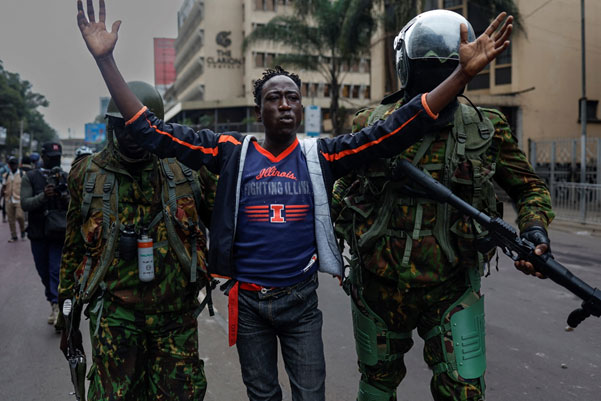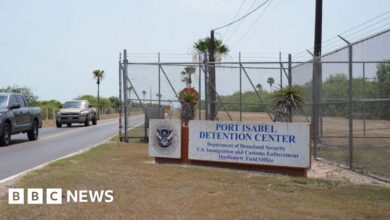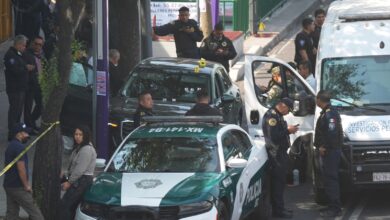Kenya’s Shadow War on Activism — Global Issues


LONDON, Jan 27 (IPS) – Kenya’s young protesters are paying a high price for speaking out. Last June, a protest movement led by first-time activists from Generation Z emerged in response to the government’s Finance Bill, which would have introduced sweeping tax increases. The government quickly withdrew its plans, but protests continued, articulating anger at economic strife, elite corruption and out-of-touch politicians. The government’s response has been violent. Police have used batons, teargas and water cannon against protesters. On the worst day of violence, 25 June, when some protesters attempted to storm parliament, police fired live ammunition. Over 60 people were reported killed during the protests. At least 1,200 were reportedly arrested.
Since then, there’s been a wave of abductions of young activists. At least 82 people have reportedly been abducted by armed plainclothes groups since June. Some were taken ahead of major planned protests. More than six months after the protests began, abductions continue. While most have been released, as many as 20 people are still thought missing.
On 6 January, five young men who’d been abducted the previous month were found. Among them was Kibet Bull, known for his satirical cartoons. One of the five reported being whipped and beaten. Several others abductees describe traumatic experiences in detention, although there’s a chilling effect: many of those who’ve been released have decided not to speak out about their experiences.

Security forces deny any involvement. But a government minister, Public Service Cabinet Secretary Justin Muturi, recently claimed that Kenya’s National Intelligence Service was responsible for the abduction of his son, Leslie Muturi. He was only released after President William Ruto intervened.
Ruto, whose resignation was demanded by protesters, promised on 27 December that the abductions would stop. But at the same time, he seemed unwilling to listen to activists’ demands, blaming parents for not raising their children properly and telling young people not to disrespect leaders on social media.
Now people are protesting to demand the release of the abductees and accountability for those responsible. These protests, like those before them, have been met with police violence. On 27 December, police responded to a protest calling for the release of six people with teargas and arrests. The authorities charged protesters with unlawful assembly and incitement to violence.
Protests against the abductions have continued in the capital, Nairobi, and elsewhere, as have protesters’ arrests.
In another disturbing development, youth activist Richard Otieno was attacked by three unidentified people and killed in the town of Elburgon on 18 January. He was known in the community for criticising the government and the local member of parliament, and had been arrested for taking part in the 2024 protests. His murder sparked local protests.
Police repression
Violent repression of protests has long been a problem in Kenya. In June 2023, six people died in opposition-organised protests against taxes and the high cost of living. More people were killed during the protests in June 2024, and when protesters gathered in Nairobi in October to hold a vigil for them, police lobbed teargas canisters and arrested several activists who tried to enter the park where the protest was taking place. Police also used violence against anti-femicide protests in November and December 2024.
But the current wave of abductions is a troubling further level of repression. It suggests that those in power have been seriously rattled by the emergence of a new generation of protesters and their demands, and by their persistence in the face of police violence, and are stepping up their tactics accordingly.
As well as routinely using violence against protesters, police are accused of complicity in abductions. Even if they don’t directly commit them, they’re accused of standing by and allowing them to happen, and failing to investigate them and bring justice to the victims. Few cases have been solved. As a result, the rule of law is being called into question.
Kenya is on a dangerous trajectory. As a result of the brutal crackdown on protests, in December the country’s civic space rating was downgraded to ‘repressed’, the second worst rating, on the CIVICUS Monitor, our collaborative research initiative that tracks the health of civic freedoms around the world.

Demand for change
Abductions may subdue some people who’ve found themselves at the sharp end of state violence. But they could also backfire. People who’ve argued that politicians and the state can’t be trusted are being vindicated. The result will be a further loss of trust in public institutions.
Young Kenyans have found their voice, proving their willingness to speak out, organise and demand an end to self-serving and corrupt politics. The protests were marked by creativity, full use of social media and unity across usually divisive ethnic lines. They helped inspire similar protests in several other African countries, including Nigeria and Uganda, creating a rare feeling of shared confidence that change could come. Those hopes haven’t been entirely subdued. The abductions may have silenced individuals, but the collective appetite for change hasn’t gone away.
Andrew Firmin is CIVICUS Editor-in-Chief, co-director and writer for CIVICUS Lens and co-author of the State of Civil Society Report.
For interviews or more information, please contact [email protected].
© Inter Press Service (2025) — All Rights ReservedOriginal source: Inter Press Service
https://static.globalissues.org/ips/2025/01/Simon-Maina.jpg
2025-01-27 11:07:23




